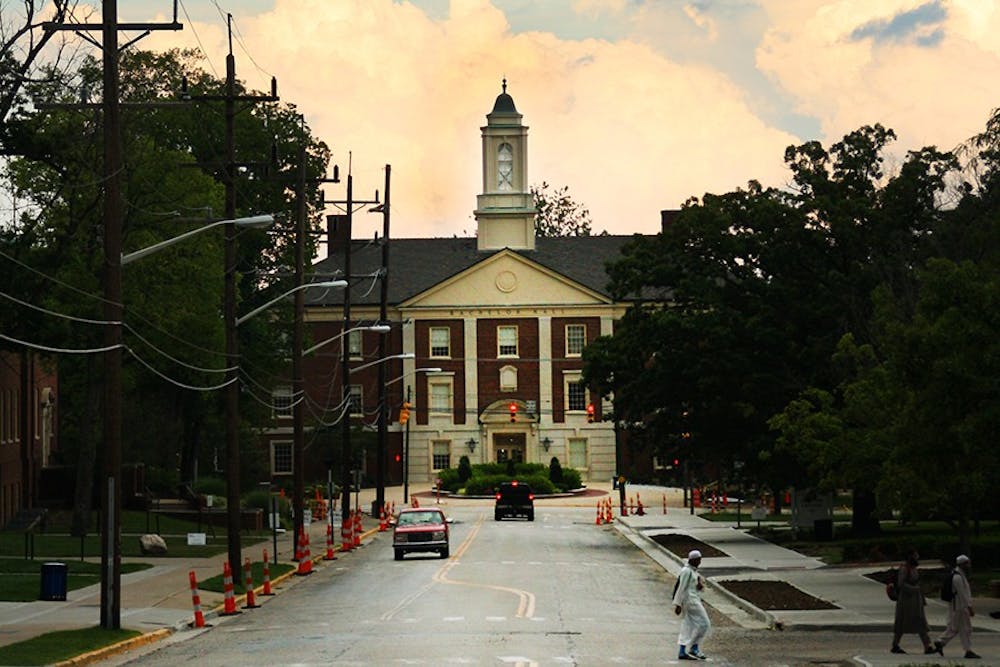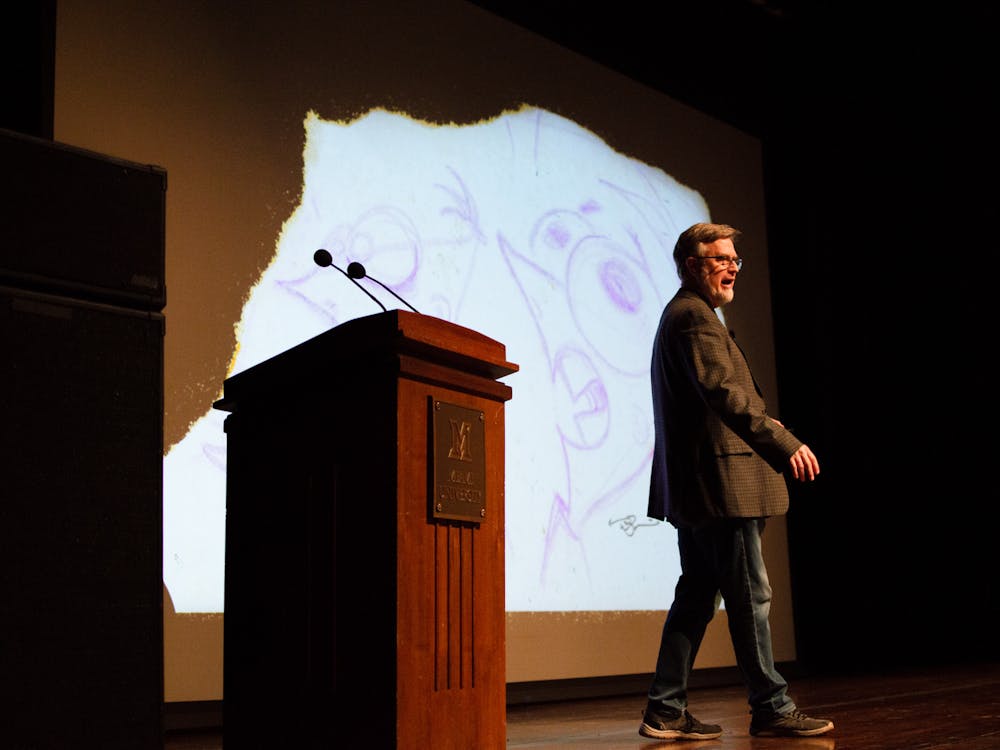By Katie Taylor, Special Projects Editor
The following piece is the second in a series of three that will address the complexities of sexual assault. The first of these was published April 3, 2015 in The Miami Student, here.
The Assault
Tears rolled down her face and hit the sidewalk as she limped down High Street, still wearing the Halloween costume, now in tatters, that she had put on the night before. Shutting out questioning gazes from the Uptown lunch crowd, her eyes remained locked on the ground for the rest of the long walk back to her dorm in East Quad.
"[My Resident Assistant] took me into her room and I told her everything that was going on and she essentially had to explain to me that I was sexually assaulted," said Grace, who asked that her name be changed to protect her identity. "I wasn't able to comprehend that at the time."
Grace was in her first year at Miami when she went out with some friends Oct. 30, 2011. After attending a couple Halloween house parties, the group went to Decibel, an Uptown bar she had never been to.
It was there, very late, that an older male in the group, a Miami student, insisted they all take shots. Grace recalled him handing her the first. Several minutes later, just as the bar closed, the room began to spin.
Grace scanned the crowd frantically for her friends as a herd of students pushed down the stairs to exit onto High Street, but the next thing she knew she was sitting on the curb, alone and disoriented.
It wasn't long before she was approached by the student who had given her the shot. Commenting on her disheveled state, he said he would take care of her.
"He put his arm around me and we started walking in the opposite direction of where my dorm was," Grace said. "And then I don't remember anything until the next morning."
When she came to, she didn't recognize the room, but she did recognize the boy in bed next to her. The pain hit her when she rolled over, saw her clothes on the floor and asked the male what happened.
"He said, 'We had sex three times - I thought it would be more memorable than that.' He said, 'If you want to remember, we can have sex again.'"
Enjoy what you're reading?
Signup for our newsletter
When Grace refused and insisted she had to leave, the boy showed her the door.
Finding Justice
It was the next morning, the Sunday of her first Halloween weekend in Oxford in 2011, when Grace went to McCullough-Hyde Memorial Hospital at the urging of her resident assistant. The doctor informed her that the vaginal damage done was consistent with what they see in females after giving birth.
Grace said she had taken no drugs the night before. But a urine sample revealed traces of amphetamine in her system.
McCullough-Hyde staffers suggested a second and more extensive round of tests that could have identified the chemical in her system, but Grace said no. She just wanted to go home and put the trauma behind her.
She realized later that her decision to forgo more testing complicated the possibility of prosecution.
"That left it, legally, a very gray case-'he said she said.' The prosecuting office was pretty terrible about it and my case ended up getting dropped because they didn't think it was a cut and dried case and that it was going to be a waste of their time," Grace said.
Though her report to the Oxford Police Department did not result in a prosecution, Grace did find out something else the day she went in to the station to report the crime. The police asked who the perpetrator was, but Grace was interrupted after saying his first name.
"Before I even got his last name out the police knew who I was talking about because the perpetrator was well-known on campus for this type of behavior and criminal action," she said.
Grace soon learned that the accused had run into sex-related trouble two years before her own assault, but the university had taken no disciplinary action against him.
Miami University and the Oxford Police Department investigated the accused in 2009 after his fraternity brothers reported him for voyeurism. He was accused of recording sexual encounters with women without their knowledge, according to police records. He was not prosecuted in the criminal courts.
Videos of sexual acts were found in the accused's possession, but Miami did not hold a conduct hearing because they could not identify the women in the tapes as students of the university, according to an email from university President David Hodge to Grace's father.
In October of 2013, Grace filed a lawsuit against Miami University for negligence for not expelling the accused after these earlier incidents. She said that by failing to take action in the earlier case, the university left a predator on campus. Had he been expelled earlier, Grace said, she would not have been raped.
Because it remains under adjudication, Hodge declined to comment on the specifics.
"Obviously, if there's a case, we have a disagreement about the facts," he said. "I believe that a lot of things continue to evolve-our ability to respond to any incident, our ability to track behaviors-all of that has been improving at Miami and nationally as we've paid more attention to this. By all the accounts that I can see, we have people who are first-rate in their responses that they're giving to victims when they come forward."
In the email to Grace's father, Hodge explained why the administration previously held off on disciplinary action.
"We are a public university and the law and our policies require that all students receive a measure of due process, notice of the charges against them, and an opportunity to challenge the evidence against them before we can suspend or dismiss them…there was not, in our opinion, sufficient evidence adduced as a result of the voyeurism investigation to enable us to initiate the disciplinary action to dismiss [the accused]," the email read.
It wasn't until Grace reported her own assault to the university that a disciplinary hearing was held. When the crime and the accused's name were published in The Miami Student, another female came forward, alleging the student had sexually and physically assaulted her the night before Grace was attacked.
"[The accused] began to hit and choke her. [The victim] began to lose breath," read the second victim's police report. "[The accused] continued to pull her hair and punch her in the chest. [The accused] also slapped [the victim] in the face, and stuffed his fingers and hand into her mouth. At one point he ripped a nose piercing from her nose."
The accused was expelled Dec. 8, 2011 after Miami's Office of Ethics and Student Conflict Resolution (OESCR) found him responsible for two counts of sexual assault and one count of physical assault, according to university documents. In accordance with Miami's policies, the reason for the accused's dismissal was not reflected in his academic transcript. Shortly after expulsion, he was accepted into another university.
The Aftermath
Grace said the university's hearing in her case went smoothly, yet, she still has doubts about Miami's procedures for investigating sexual assault.
"I wouldn't say I trust the disciplinary system. I've heard too many stories and I just know too much-stuff slips through the cracks," she said. "With my case it was black and white. There were two girls sitting there [in the hearing] who were assaulted within 24 hours by the same guy. They couldn't not kick him out."
Despite her reservations, Grace expressed great appreciation for the individuals, including Becca Getson, the university's sexual assault response coordinator, who worked with her to make sure the process was as painless as possible. She encourages all survivors to take that step and trust the university advocates with their stories.
The lawsuit, on the other hand, has dragged on for years, amplifying the trauma caused by the assault. Grace began the legal process her first year at Miami. She is now in her fourth year and is being treated by doctors for post-traumatic stress disorder (PTSD). As a result, Grace has only been able to complete the number of credit hours needed to reach sophomore status.
"People often look at this stuff as a 30-minute episode of 'Law and Order,' and that's not how it is," she said. "It takes so much longer to even make a dent, to try and make a difference … It takes it out of you. It's like a kick to the stomach."
Regardless of the outcome, and despite the pain it has caused, Grace said she feels the need to continue with her case-not because it will bring her justice, but because she wants to make sure Miami University administrators are doing everything in their power to protect their students.
"It's more about me just making a point to Miami that this isn't okay. I'm essentially, at the end of the day, not going to get anything out of this personally," she said. "It's more about me just making sure this doesn't happen again."




